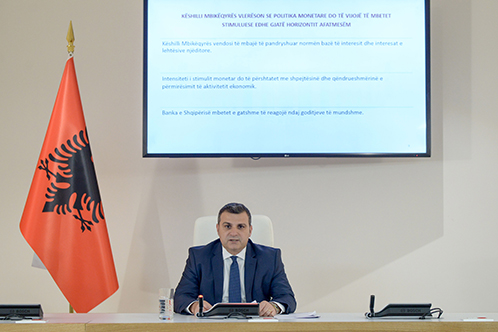BANK OF ALBANIA
PRESS RELEASE
Governor Sejko: Statement to the Press Conference on the Monetary Policy Decision
Publication date: 08.05.2019
Dear ladies and gentlemen,
Today, on 8 May 2019, the Supervisory Council of the Bank of Albania reviewed and approved the Quarterly Monetary Policy Report.
The new information analysed in this Report has resulted, overall, in line with our expectations. This information suggests that the Albanian economy continues on a positive growth trajectory, which has enabled a fuller utilisation of production capacities and has sustained the build-up of domestic inflationary pressures. Also, this information confirmed our expectations for a slowdown in economic growth rates in the fourth quarter of 2018, and of inflation in the early months of 2019.

The slowdown in inflation is attributed mainly to the action of supply-side factors, but it resulted somewhat stronger than expected.
Our forecasts for the outlook remain positive. These forecasts suggest further growth of economic activity and build-up of domestic inflationary pressures. Nonetheless, the deterioration in the external environment has postponed our estimation for the return of the economy to equilibrium and of inflation to target.
These developments confirm the adequacy of the current monetary policy stance, and emphasise the need for continuing the accommodative monetary policy stance in the medium-term horizon.
Let me now present in greater detail the report and the underlying reasons for this decision.
***
Annual inflation averaged 1.6% in the first quarter, down from the previous quarter. The increase in rent and water prices recorded a year earlier was faded out at the beginning of this year, decreasing the contribution of these groups to inflation. In addition to this effect, the increase in services prices slowed down and the inflation of agricultural prices registered a strong contraction in March.
From the macroeconomic perspective, the inflation slowdown reflected a fuller transmission of the exchange rate appreciation, the slowdown of inflation in partner countries, and the effect of supply-side shocks on agricultural products. On the other hand, economic growth has led to a build-up in domestic inflationary pressures, whereas pressures from the external environment diminished.
According to INSTAT data, economic activity expanded by 3.1% in the fourth quarter of 2018, slowing down from the previous quarters. Economic growth for 2018 was 4.1%. It was underpinned by private sector demand, which benefited from employment growth, improvement of confidence and favourable financing conditions. On the other hand, the fiscal policy continued to pursue a consolidation path, stated in positive budget balance values, and providing low contribution to economic growth.
The expansion of aggregate demand has led to the reduction of spare capacities in the economy. According to INSTAT, employment has trended upward and the unemployment rate stands at low historical levels. Moreover, data from the business survey suggest production capacities were used more intensively. In response to these developments, the average wage in the economy has tended upward, albeit the pace of this trend remains low. In parallel, the performance of core inflation shows that the gradual convergence of the economy toward the potential has not been accompanied yet by adequate inflationary pressures for the return of inflation to target.
Our accommodative monetary policy has enabled creating favourable financing conditions. Domestic financial markets operate amid a calm environment, with low interest rates, low risk premiums and a stabilisation trend of the exchange rate.
In response, the pace of credit growth has improved. Adjusted for the exchange rate and written off loans, the portfolio of credit to the private sector recorded 6% annual growth in the first quarter of this year. The performance continues to be supported by the expansion of credit in lek, which accounts for around 48% of total credit. In parallel, developments in recent months point to a more balanced performance of the credit portfolio, with an upward contribution by both households and enterprises.
In our assessment, the underway consolidation of the banking sector, the continuous reduction of credit risk, and the expected demand growth create the premises for a sustainable growth of credit in the future. Yet, the materialisation of this projection requires that banks adopt a more active approach to lending
Judging on the current development trends and the balance of underlying factors, the Bank of Albania deems that the medium-term outlook is positive. The expansion of the economic activity will enable further employment growth and will contribute to faster increase in wages and production costs. These developments will enable the return of inflation to target at the beginning of 2021.
With regard to our earlier projections, the estimation for the return of the economy to equilibrium and of the inflation to target has been postponed slightly in time. This revision is determined mostly by more pessimistic projections for the external economy. It also reflects the need for a full absorption of supply-side shocks on inflation and the full cancelling out of decelerating effects from the exchange rate.
Downside risks dominate the forecasting horizon. They are related mostly to uncertainties surrounding the external environment, duration and impact from the exchange rate appreciation on inflation, stability and recovery of bank credit and, lastly, the tense political situation at home.
***
Based on these considerations, the Supervisory Council deems that the monetary policy stance will remain accommodative in the medium-term horizon. In this meeting it decided to:
- Keep the policy rate unchanged at the current level 1.00%; and,
- Keep the overnight deposit and overnight lending facilities unchanged at 0.1% and 1.9%, respectively.
Also, judging on the baseline scenario and the balance of risks, the Supervisory Council deems that the normalisation of the monetary policy will be very cautious. In any case, the intensity of the stimulus will be adjusted for the speed and steadiness of the economic activity improvement, and the Bank of Albania stands ready to respond to potential shocks.

 Twitter
Twitter
 Youtube
Youtube
 Facebook
Facebook
 Flickr
Flickr
 RSS
RSS
 Subscribe
Subscribe
 Feedback
Feedback